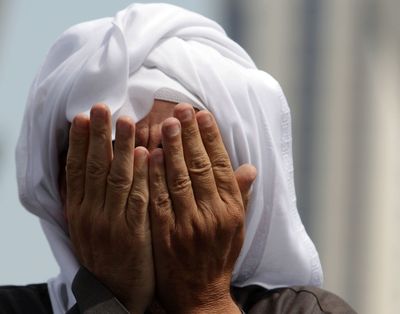Gulf council sends forces into Bahrain
Opposition groups decry intervention

MANAMA, Bahrain – A Saudi-led military force crossed into Bahrain on Monday to prop up the monarchy against widening demonstrations, launching the first cross-border military operation to quell unrest since the Arab world’s rebellions began in December.
Opposition groups immediately denounced the intervention as an occupation that pushed the tiny island kingdom dangerously close to a state of “undeclared war.”
Bahrain’s majority Shiite Muslims see an opportunity to rid themselves of two centuries of rule by a Sunni monarchy. But Gulf Sunni leaders worry that any cracks in Bahrain’s ruling system could threaten their own foundations. Protests are already flaring in Oman, Kuwait and even tightly ruled Saudi Arabia.
Gulf leaders are also concerned that political gains by Bahrain’s Shiites might give Shiite Iran a stepping stone to its arch-rival Saudi Arabia, connected to Bahrain by a wide causeway.
Instead, the Saudis and other members of the Gulf Cooperation Council sent forces the other way, deploying about 1,000 troops by land and air and cementing the entire six-nation alliance to the fate of Bahrain’s rulers, who are key U.S. allies as hosts of the American Navy’s 5th Fleet.
Shortly after word of the foreign military reinforcements began spreading through Bahrain, protesters blocked roads in the capital Manama. Thousands of others swarmed into Pearl Square, the symbolic center of the monthlong revolt.
“No to occupation!” demonstrators cried in the square.
The worries about Iran have persisted, even though there are no apparent links between Tehran and Bahrain’s opposition.
“The Gulf leaders have tried to legitimize this. They portray it not as intervention in an internal Bahrain dispute, but rather as an action against an external threat,” said Sami Alfaraj, director of the Kuwait Center for Strategic Studies.
In Tehran, authorities had no comment on the Gulf force moving into Bahrain.
In Washington, White House spokesman Jay Carney pointedly did not call on the Saudi-led force to withdraw.
“We are calling on the countries in the region to show restraint and pointing to the fact that the dialogue that can bring about political reform is essential for the stability of the countries in the region and their continued economic prosperity,” Carney said.
It’s not clear when Bahrain sought outside help. The rulers have faced a month of nonstop unrest that has left seven people dead and the country drifting toward open sectarian conflict.
There have been scenes of defiance and disobedience so unsettling that pro-government parliament members appealed to Bahrain’s king to impose martial law. On Sunday, protesters paralyzed Bahrain’s finance district with roadblocks and then stood their ground – and in some cases pressed forward – against riot police firing tear gas in Pearl Square.
A statement on the state-run Bahrain News Agency said troops from the GCC’s Peninsula Shield Force have been deployed “in line with the principle of common destiny bonding.” The bloc is made up of Saudi Arabia, Oman, Kuwait, Bahrain, Qatar and the United Arab Emirates.
The reason for the mission was “the common responsibility of the GCC countries in maintaining security and stability,” the statement said.
The Peninsula Shield Force was created in the 1980s. Military units under a GCC command have been sent to Kuwait, including during the 1991 U.S.-led campaign to oust Saddam Hussein’s force and in 2003 before the invasion of Iraq. The current action marks a significant shift to help a government quell internal unrest.